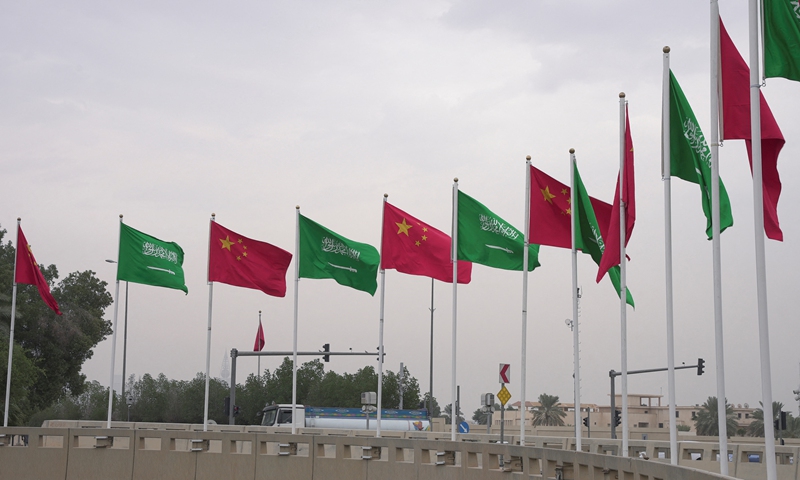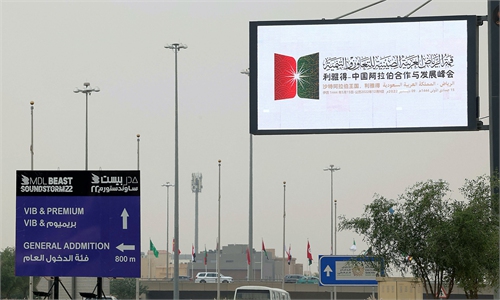China, Saudi Arabia deepen relations amid development synergy
Xi, Saudi king agree to hold regular head-of-state meetings

The national flags of China and Saudi Arabia are seen on the street of Riyadh ahead of the China-Arab States Summit on December 7, 2022. Photo: thepaper.cn
A grand welcoming ceremony, high-level bilateral meetings and wide-covering investment agreements are among proofs that China-Saudi Arabia relations have been lifted to a new high.
On Thursday, President Xi Jinping and Saudi King Salman bin Abdulaziz Al Saud signed an agreement on the comprehensive strategic partnership between the two countries and also agreed to hold a meeting between the two heads of state by turns every two years.
Experts believed that Saudi Arabia's industrial diversification endeavor can be a perfect match for China's Belt and Road Initiative and its policy of developing high-tech industries. During the visit, Saudi and Chinese companies signed 34 investment agreements, covering green energy, transportation, logistics, medical industries and construction, local media reported.
In the welcoming ceremony held by Saudi Crown Prince and Prime Minister Mohammed bin Salman Al Saud on behalf of King at the royal palace in the capital Riyadh on Thursday, Xi reviewed the guard of honor, who extended the most solemn welcome to the Chinese president with traditional sword-holding etiquette.
Cultural roots
This visit also witnessed the efforts of the two sides to enhance people-to-people exchanges between the two countries. In a signed article published Thursday on the Saudi newspaper Al Riyadh, Xi said that "China and Saudi Arabia have admired each other and conducted friendly exchanges since ancient times. The prophet Muhammad said, 'Seek knowledge even if you have to go as far as China.'"
Such mutual respect has been carried forward to today. On Thursday China agrees to list Saudi Arabia as a destination for group travel and expand personnel exchanges as well as cultural and people-to-people exchanges between the two sides.
Experts believed that China-Saudi relations play a crucial role in boosting the relations between China and Arab countries, serving as an example as South-South cooperation. As the only G20 member among Arab countries, Saudi Arabia has seen its regional influence grow, playing a leading role in the affairs of GCC as more Arab countries are realizing that compared to China that promotes peace and development in the region, the US instigated conflicts and divergences, imposes extra geopolitical conditions in its cooperation with Arab countries.
A new level
Abdulaziz O. Sager, chairman of the Gulf Research Center in Saudi Arabia told the Global Times that China-Saudi Arabia relationship is a good role model that can be expanded to different countries in the Middle East region, as the great relationship is based on mutual interests and non-intervention in the domestic issues from both sides.
"We will not interfere in the issues between the US and China. We will not take US' position when it comes to China. We think our relationship with China is extremely important, and extremely valuable," said Sager.
China and Saudi Arabia will reportedly sign a plan to harmonize the Kingdom's Vision 2030 with China's Belt and Road Initiative, according to people familiar with the matter.
"There is a lot of complementarities between BRI and the Saudi vision 2030," said Sager, noting this unleashes many opportunities for China and Saudi Arabia to have stronger ties. He expects the China-Saudi Arabia and China-Arab relations to move forward not only from an economic dimension, but to have a political dimension, saying the Arab countries are looking for more constructive engagement with China on regional issues that are of concern to them.
In the past, many Middle Eastern countries were seen as proxies of the West but are now trying to get rid of such identity by working on development on their own, seeking a balance in cooperation with major powers, Zhu Weilie, director of the Middle East Studies Institute at Shanghai International Studies University, told the Global Times on Thursday.
"China-Saudi strategic relations have now entered a new level covering many more areas, and the two countries share similar aspirations in the country's development and reform, especially in green energy and digital economy," Zhu said, adding that deepening cooperation is in line with their own development targets, and it's not targeting any third-party country.
Fahad Almeniaee, Director of the China and Far East Unit of the Riyadh-based Center for Research and Intercommunication Knowledge, told the Global Times that the relationship between the Kingdom of Saudi Arabia and China is a multi-faceted relations ranging from trade to culture. "Xi's visit has been successful by all standards," he emphasized.
Broader cooperation
Xi also met with leaders of several other regional countries, including Egyptian President Abdel Fattah al-Sisi, Palestinian President Mahmoud Abbas and Kuwait's Crown Prince Sheikh Mishal Al-Ahmad Al-Jaber Al-Sabahon, on Thursday.
Commenting on China-Arab States Summit, news site Middle East Eye said the goals of China and the Gulf are aligned in many domains, which means that the summit is only likely to produce new synergies. "It is a growing reality in the Gulf and it is likely that the summit will elevate these economic synergies to a new level and a possible free trade agreement, oil deals in yuan and membership of BRICS Plus would hugely strengthen Gulf-China ties and further challenge US hegemony," the news site said.
Xi's visit to Saudi Arabia came amid strained US ties with the Middle East country, some US media reports said, which also underlines Beijing's growing influence in the Middle East and draws "inevitable comparison" to a low-key welcome afforded to Biden when he visited Saudi Arabia in July.
Compared with relations between the US and Arab countries, China's relations with them are based on equality and mutual respect with honesty, unlike the US which brings ideological bias in its interactions with the countries, some experts said.
"And more Gulf countries understand that when the US mentions 'security,' it has become unsecure for them while China-proposed ideas promoting peace and development are much more welcomed," Wang Guangda, secretary-general of the China-Arab Research Center on Reform and Development at Shanghai International Studies University, told the Global Times.
China hopes to promote the benefits for people of the both sides rather than competing with the US in terms of the influence in the region or filling "vacuum" left by the US, Wang said.
China-GCC relations have achieved sound, steady and comprehensive development, staying at the forefront of China's relations with Arab countries. China has remained the GCC's largest trading partner for a long time.
In 2021, the trade volume between China and GCC bucked the overall downward trend and rose by 44 percent. And China-GCC relations have set a fine example of cooperation between China and other developing countries.





